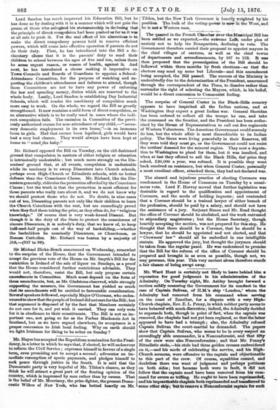Lord Sandon has much improved his Education Bill, but he
has done so by dealing with it in a manner which will not gain the praise of those who eulogised his statesmanship in. declaring that the principle of direct compulsion had been pushed as far as it was at all safe to push it. For the real effect of his alterations is to make the direct compulsory powers held in reserve efficient powers, which will come into effective operation if parents do not do their duty. First, he has introduced into the Bill a de- claratory clause that it is the parents' duty to send their children to school between the ages of five and ten, unless there be some urgent reason, or reason of health, against it. And next, he has introduced a clause making it imperative on Town Councils and Boards of Guardians to appoint a School- Attendance Committee, for the purpose of watching and re- porting the children's attendances and failures to attend, though these Committees are not to have any power of enforcing the law and spending money, duties which are reserved to the whole body. Lastly, Lord Sandon is establishing Day Industrial Schools, which will render the machinery of compulsion much more easy to work. On the whole, we regard the Bill as greatly strengthened. It now contains a mild form of direct compulsion, as an alternative which is to be really used in cases where the indi- rect compulsion fails. The omission in Committee of the previ- ously authorised excuse for non-attendance of any child,—" neces- sary domestic employment in its own home,"—is an immense boon to girls. Had that excuse been legalised, girls would have had a very bad chance. They would always have been kept at home to " mind,the baby."






























 Previous page
Previous page